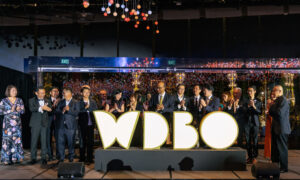 Advanced analytics, RPA and AI as key foci for technological
Advanced analytics, RPA and AI as key foci for technological
transformation in the next 12 months
China CFOs have become more optimistic about the economic outlook,
as the global economic upswing which roughly began in mid-2016 has become
broader and stronger. However, one third of the respondents have expressed a
certain level of pessimism towards the economy, specifically with regards to
the fast-moving and unpredictable development of global geopolitical events,
according to the latest edition of the CFO Survey from Deloitte China CFO Program.
Every six months, Deloitte conducts a
survey to gauge the views of CFOs in China towards the economic climate, as
well as to engage them to discuss other key issues impacting their businesses.
In addition to reflecting CFOs’ economic sentiment, the latest survey also
seeks to analyze their perception towards different types of
emerging technologies, the innovative transformation of their organizations, as
well as the challenges they encounter in adopting new technologies. The survey
was conducted from February to March 2018, with 138 valid responses.
“China’s economic resilience, underpinned
further by new governmental strategic measures such as the Belt and Road
Initiative and ‘BRIC Plus’, has boosted market confidence towards the business
outlook,” said Sitao Xu, Chief
Economist of Deloitte China. However, he added that survey respondents seem
to be unsettled about the increase in trade tension, with 14 percent of CFOs
citing trade protectionism as one of the potentially high impact risk factors.
According to the survey,
“detrimental government policy/regulation” remains the dominant risk
factor in the eyes of CFOs, who were also unnerved by the stronger likelihood
of the rise in capital costs as a result of the anticipated U.S. interest rate
hike. Meanwhile, receding anxiety towards geopolitical issues among CFOs may
have contributed to the overall optimism in economic outlook, as only 9 percent
of survey respondents indicated this as an important risk factor, versus 23 percent
from the previous survey.
In an era of unprecedented innovation, organizations
around the world and across different industry sectors have proactively sought
to explore and adopt disruptive technologies in order to reinvent how they do
business, engage with customers and drive efficiencies across the value chain. Based
on the survey, CFOs on the whole understand that technological transformation has
become a pervasive trend, with 68 percent of respondents indicating that over
50 percent of their finance processes will be significantly altered by technology
in the next 5 years. However, the strongest obstacles for CFOs in driving
technological adoption point to concerns about cost and obtaining internal buy-in.
In many cases, this has slowed down the pace of their internal transformation
efforts. To address these challenges, 87 percent of survey respondents acknowledge
the importance of being more proactive in embracing emerging technologies,
which they agree would help their organization overcome cost pressure, cope
with increasingly complex business demands, and more confidently lead through
times of economic and regulatory uncertainties.
CFOs also indicated that
“Cloud” is now the most widely adopted emerging technology for their
organizations. Looking forward, however, survey results show that there would
likely be a shift of focus from “Cloud” towards “Advanced
Analytics”, “RPA/Process Robotics” and “Artificial Intelligence”
in the next 12 months.
“It is encouraging to see that CFOs
and finance leaders recognize the significant potentials driven by new
technologies. However, they continue to face internal barriers, such as
obtaining buy-in and convincing other decision makers about the long-term benefits
of technological transformation. In addition to their role of measuring
financial impact, CFOs should take on the responsibility of driving the
strategic planning of technological transformation, as well as creating the
mechanism for effective managing its implementation throughout the
organization,” said David Wu, Finance
Transformation National Leader, Deloitte China.
About Deloitte Global
Deloitte
refers to one or more of Deloitte Touche Tohmatsu Limited, a UK private company
limited by guarantee (“DTTL”), its network of member firms, and their related
entities. DTTL and each of its member
firms are legally separate and independent entities. DTTL (also referred to as “Deloitte Global”)
does not provide services to clients.
Please see www.deloitte.com/about to
learn more about our global network of member firms.
Deloitte
provides audit & assurance, consulting, financial advisory, risk advisory,
tax and related services to public and private clients spanning multiple
industries. Deloitte serves nearly 80 percent of the Fortune Global 500®
companies through a globally connected network of member firms in more than 150
countries and territories bringing world-class capabilities, insights, and high-quality
service to address clients’ most complex business challenges. To learn more
about how Deloitte’s approximately 263,900 professionals make an impact that
matters, please connect with us on Facebook, LinkedIn, or Twitter.
About Deloitte
China
The Deloitte brand first came
to China in 1917 when a Deloitte office was opened in Shanghai. Now the
Deloitte China network of firms, backed by the global Deloitte network, deliver
a full range of audit & assurance, consulting, financial advisory, risk
advisory and tax services to local, multinational and growth enterprise clients
in China. We have considerable experience in China and have been a significant
contributor to the development of China’s accounting standards, taxation system
and local professional accountants. To learn more about how Deloitte makes an
impact that matters in the China marketplace, please connect with our Deloitte
China social media platforms via www2.deloitte.com/cn/en/social-media.
This communication contains
general information only, and none of Deloitte Touche Tohmatsu Limited, its
member firms, or their related entities (collectively the “Deloitte Network”)
is by means of this communication, rendering professional advice or services.
Before making any decision or taking any action that may affect your finances
or your business, you should consult a qualified professional adviser. No
entity in the Deloitte Network shall be responsible for any loss whatsoever
sustained by any person who relies on this communication.
© 2018. For information,
contact Deloitte China.






